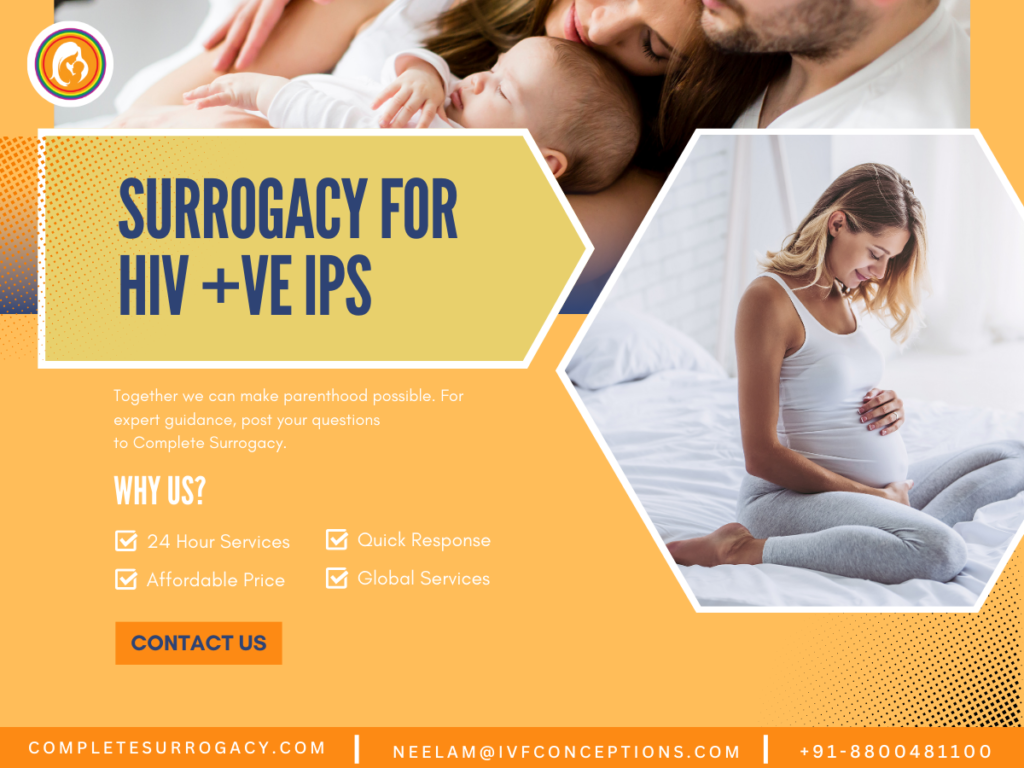It is possible to become parents via surrogacy for HIV-positive intended parents. Our comprehensive guide explores safe and supportive paths for individuals living with HIV, providing information, resources for thier parenthood.

Surrogacy for HIV +ve IPs
Surrogacy, the process by which a woman carries and gives birth to a child for another individual or couple, is a topic that has been met with both controversy and support. However, when it comes to surrogacy for individuals who are HIV-positive, the conversation becomes even more complex.
- Book an online appointment: Get a free online consultation.
- Call\W:+91-8800481100 Email:neelam@ivfconceptions.com
Despite advancements in medical treatments, the stigma surrounding HIV remains prevalent, making it difficult for those who are HIV-positive to start a family. In recent years, there has been a growing interest in using surrogacy as a means for HIV-positive individuals to have biological children without the risk of transmitting the virus. This article will explore the process of surrogacy for HIV-positive intended parents, commonly referred to as “IPs,” and the ethical considerations surrounding this practice.
Additional Resources to Read:
How Intended Parents Can Support Their Surrogate?
How much does gestational surrogacy cost?
What is the Surrogacy Intake Process For Surrogate Mother
Surrogacy is a reproductive arrangement where a woman carries and gives birth to a child on behalf of another person or couple. The purpose of surrogacy is to help individuals or couples who are unable to conceive or carry a pregnancy themselves. In the case of HIV-positive intended parents (IPs), surrogacy becomes a vital option for starting a family while minimizing the risk of transmitting the virus to the child.
Is it possible to have a child free of HIV through surrogacy?
Yes, surrogacy offers a viable option for HIV-positive intended parents (IPs) to have a child without transmitting the virus. The process involves carefully selecting a surrogate who is screened for both physical and mental health, ensuring the safety of the child. Medical advancements have significantly reduced the risk of HIV transmission during the surrogacy process.
Assisted reproductive technologies, such as in vitro fertilization (IVF), play a crucial role in minimizing this risk. In IVF, the surrogate’s eggs are not used, reducing the chances of HIV transmission. The IPs’ sperm is thoroughly tested and treated to remove any traces of the virus before being used in the fertilization process.
Additionally, preimplantation genetic testing can be conducted to ensure that the embryo is free from HIV. These precautions and advancements in reproductive medicine provide a pathway for HIV-positive IPs to have a child free of the virus through surrogacy.

Surrogacy for HIV-positive Gay Couples
The journey towards parenthood through surrogacy presents unique challenges for HIV-positive gay couples. One of the primary concerns is the legal landscape surrounding surrogacy, which can vary significantly from country to country and even within different jurisdictions.
Some countries may have laws that explicitly prohibit or restrict surrogacy arrangements for individuals with HIV. Understanding the legal implications and seeking the guidance of experienced attorneys who specialize in reproductive law is crucial for navigating this complex process.
In addition to legal challenges, HIV-positive gay couples may also face social stigma and discrimination. Society’s attitudes towards same-sex couples and individuals living with HIV can vary, which may lead to additional hurdles and emotional strain throughout the surrogacy journey. Building a supportive network of friends, family, and LGBTQ+ organizations can provide valuable resources, guidance, and emotional support during this time.
Fortunately, various support networks and resources are available for HIV-positive gay couples considering surrogacy.
While the path to parenthood through surrogacy for HIV-positive gay couples may present unique challenges, it is important to remember that with the right support, guidance, and resources, the dream of starting a family can become a reality. By navigating the legal and social aspects strategically and accessing the available support networks and resources, HIV-positive gay couples can embark on their surrogacy journey with confidence and hope for a joyful future as parents.
The Cost of Surrogacy for HIV+ IPs
Surrogacy can be a costly endeavor, and this is no different for HIV-positive intended parents (IPs). HIV-positive IPs need to be aware of the financial aspects involved in surrogacy and plan accordingly.
The potential expenses can include various medical procedures, such as fertility treatments, IVF, and prenatal care, which may be necessary to ensure a successful surrogacy journey.
Additionally, legal fees are an important consideration, as IPs may need to navigate complex legal processes and ensure all necessary contracts and agreements are in place. Agency costs, including finding and matching with a suitable surrogate, can also be a significant financial consideration.
Furthermore, surrogate compensation is an important factor to take into account, as surrogates should be fairly compensated for their time, effort, and commitment to the process.
Additional surrogacy costs like spem wash, additional compensation for the surrogate mother, and additional agency fees to find a surrogate mother are a few of the extra fees that you might incur during your surrogacy journey.
It is worth noting that there may be financial assistance programs or insurance options available to help alleviate the financial burden for HIV-positive IPs. Exploring these options and consulting with professionals in the field can provide valuable guidance in managing the costs associated with surrogacy.
How safe is HIV+ Surrogacy?
Surrogacy for HIV-positive intended parents (IPs) is a carefully regulated and safe process that prioritizes the health and well-being of all parties involved. Concerns and misconceptions surrounding the safety of HIV+ surrogacy often stem from a lack of understanding about the medical protocols and guidelines in place. It is important to highlight that with advancements in medical technology and comprehensive screening processes, the risks involved have been significantly minimized.
Medical protocols for HIV+ surrogacy involve thorough testing and screening of both the intended parents and the surrogate. This includes testing for viral load, CD4 counts, and medication adherence to ensure that the HIV-positive parent is well-managed and has a suppressed viral load. The surrogate is also screened to ensure she is in good health and does not have any contraindications to carrying a pregnancy.
Guidelines provided by medical professionals, fertility clinics, and surrogacy agencies are followed diligently to ensure the safety of all parties. Regular monitoring and medical supervision throughout the journey are essential to closely monitor the health of both the surrogate and the developing fetus.
Open communication and transparency are paramount in HIV+ surrogacy. All parties involved, including the intended parents, surrogates, and medical professionals, must maintain a high level of honesty and openness about their medical history, treatment plans, and any potential risks or concerns. This allows for informed decision-making and proper management of the surrogacy process.
Proper screening processes are in place to minimize potential risks. This includes conducting comprehensive medical evaluations, psychological assessments, and legal checks for all parties involved. Surrogacy agencies work closely with medical professionals and legal experts to ensure that all necessary precautions are taken to protect the health and well-being of everyone involved.
Additional Resources to Read:
Choosing the Best Fertility Clinic: Tips for Finding the Right One
Choosing Between International and Domestic Surrogacy
How Intended Parents Can Support Their Surrogate?
How To Choose Between IVF and IUI: A Comprehensive Guide
In summary, HIV+ surrogacy is a safe option for intended parents, provided that proper protocols, guidelines, and screening processes are followed. With advances in medical technology and a commitment to open communication and transparency, the risks associated with HIV+ surrogacy have been significantly mitigated. HIV-positive IPs must work closely with experienced professionals who specialize in this field to ensure a successful and safe surrogacy journey.
Conclusion
In conclusion, surrogacy for HIV-positive intended parents is a complex topic that requires careful consideration and adherence to legal and medical protocols. While the process may present challenges, HIV-positive individuals can become parents through surrogacy.
With the help of a knowledgeable and experienced surrogacy agency, as well as proper medical care and support, individuals living with HIV can successfully navigate the surrogacy process and fulfill their dreams of starting a family. It is important to continue to educate ourselves and break down the stigma and barriers surrounding HIV and surrogacy, allowing everyone the opportunity to experience the joys of parenthood.
If you’d like to learn more about IVF, Egg Donation, or surrogacy services globally, check out the rest of our website at Complete Surrogacy Agency. We offer legally secure and affordable surrogacy consulting services for FREE.
For more resources on IVF and Surrogacy, browse our other web page- IVF Conceptions.
For more resources on IVF and Surrogacy, browse our other web page- Georgia Surrogacy Agency.
Our team has over 13 years of experience facilitating surrogacy arrangements, egg donation, and serving as an advocacy resource for infertile couples and LGBTQ individuals seeking to build families.
Our founder and chief surrogacy consultant, Neelam Chhagani, passionately helps couples struggling with fertility challenges. Since starting our surrogacy consulting agency in 2013, we’ve helped welcome over 500 babies for intended parents nationwide.
Our team includes experts from diverse backgrounds with leading reproductive attorneys, professionally trained top fertility doctors, former surrogacy case managers, experienced and kind surrogate mother and egg donor coordinators, mental health professionals specializing in infertility counseling, and a logistic support team to assist you in your chosen surrogacy country.
References used:
FAQs
How does being HIV positive affect the process of surrogacy for intended parents?
Being HIV positive can significantly affect the process of surrogacy for intended parents. Many countries and surrogacy agencies have strict requirements for intended parents, including being free from certain infectious diseases like HIV. This is done to ensure the safety and well-being of the surrogate mother and the unborn child.
However, with advancements in medical technology and treatments, some individuals living with HIV may still be able to pursue surrogacy under certain circumstances, such as having a low viral load and being on consistent antiretroviral therapy. Sperm wash is one of the most commonly used methods during fertility treatments.
Each case is unique, and intended parents need to consult with medical and legal professionals familiar with surrogacy and HIV to understand the options and potential challenges involved.
What precautions and medical protocols are in place to ensure the safety of the surrogate mother and the baby in cases of HIV positive intended parents?
In cases where the intended parents are HIV positive, the safety of the surrogate mother and the baby is of utmost importance.
- Precautions and medical protocols are in place to minimize the risk of transmission.
- These may include pre-screening of the intended parents to assess their viral load and overall health, adherence to antiretroviral therapy to reduce viral replication, and close monitoring of the surrogate mother’s health throughout the pregnancy.
- Additionally, medical professionals may implement procedures such as sperm washing and in vitro fertilization to further reduce the risk of transmission.
- Regular testing and monitoring are usually conducted to ensure the health and well-being of both the surrogate and the baby.
Table of Contents
Contact Us For A Free Surrogacy Consultation!
Hey, I’m Neelam. I’m determined to make a business grow. My only question is, will it be yours?

About Neelam
Neelam Chhagani, MA (Counselling Psychology), PGD (Mental Health), and Holistic Infertility and Third-Party Reproduction Consultant.
Member of European Fertility Society, Best Surrogacy Blogger of 2020, with 200 dedicated blogs and top contributor on Quora for Surrogacy.
Highly esteemed, authoritative, and trusted professional with a 14-year experience in international surrogacy. Advocate for Secure, Legal, and Affordable International Surrogacy.
Follow Us
Our Guarantee

Safe International Surrogacy
Global surrogacy options with best countries for surrogacy that are secure and affordable
Our Services Include:
- Personalized support and communication throughout the entire journey
- Access to affordable and high-quality ART medical facilities and treatments
- Global surrogacy options with best countries for surrogacy that are secure and affordable
- Same-sex surrogacy options – Best countries for gays surrogacy/LGBT Surrogacy
- Single parent surrogacy offered with low-cost surrogate mothers
- Guaranteed Surrogacy Baby Plan with cheapest surrogacy costs
- Legal support and guidance to ensure a smooth and secure surrogacy process
- Complete surrogacy guide so that Intended Parent makes informed choices
- Assistance in cryo-shipments
- Legal assistance from experienced reproductive attorneys
- Discovery consultations and case management
Frequently Asked Questions
Surrogacy laws and regulations vary significantly across countries and even within different states or regions. It is crucial to understand and comply with the legal framework governing surrogacy in the intended jurisdiction to ensure a smooth and legally protected surrogacy journey.
The duration of the surrogacy process typically ranges from one to two years, encompassing various factors that contribute to its timeline. These factors include the waiting period for egg donor, surrogate mother, the time required for the surrogate to conceive or number of IVF attempts, and other relevant variables.
The costs associated with surrogacy can vary widely depending on various variable and unpredictable factors such as the location, the chosen surrogacy agency, medical expenses, legal fees, and compensation for the surrogate.
That being said, intended parents can expect to pay somewhere $130,000 to $150,000 if you are looking for surrogacy in US. In case you are planning to do international surrogacy, the surrogacy price is between $50,000 to $70,000 depending upon the country and types of services taken.
Surrogacy has become an important option for LGBT+ couples who desire to have children biologically related to them. It provides an avenue for same-sex male couples or single men to become fathers and for same-sex female couples or single women to become mothers. Surrogacy has played a significant role in expanding the possibilities of family-building for the LGBT+ community. We recommend and assist you with surrogacy for gay couple in Mexico, Colombia, and Argentina. Similarly, for single parents surrogacy, above options are available.
Surrogacy success rates can vary depending on various factors, including the age and health of the intended parents, the quality of the embryos, and the experience and health of the surrogate. According to recent studies, the success rates of surrogacy can range from 40% to 70% per embryo transfer.
Surrogacy laws and regulations differ significantly from country to country. Some countries have embraced surrogacy and established clear legal frameworks, while others have banned or restricted the practice. It’s essential for intended parents to understand the legal landscape of surrogacy in their desired location and consider factors such as availability, cost, and legal protections. We will advise to consult a experienced surrogacy professional become engaging surrogacy abroad.
No, surrogacy laws vary from country to country. Some countries have banned or heavily restricted surrogacy, while others have well-defined legal frameworks. Countries like USA, Georgia and Ukraine allow commercial surrogacy. However, other countries like Canada, Australia and UK allow only altruistic surrogacy arrangements. Beside this most of the European countries do not recognise any form of surrogacy like Germany, France, Belgium, Sweden etc. Latin American countries like Colombia and Argentina only allowed affordable altruistic surrogacy.
The primary reason for preference for international surrogacy is the prohibition or restriction of surrogacy, or the allowance of only altruistic surrogacy, in the intended parents’ home countries.
In altruistic surrogacy, which involves finding a surrogate without any financial compensation, often presents challenges in terms of finding a suitable surrogate.
However, opting for international surrogacy not only reduce the overall average surrogacy cost but give opportunity to find a surrogate quickly and options to choose from many candidates.
Why Our Intended Parents Choose Us- Testimonials

Neelam is empathic and an awesome professional. She’s always available and eager to response to clients calls. She followed our process the way. Definitely recommend.
J&C (UK)
This whole journey has been absolutely wonderful. And I have such a beautiful daughter today. I have such an amazing army of family and friends surrounding me. She’s brought so much joy to everyone Especially me. I’m grateful that we moved forward I don’t know what I would do without her. So please let Mark now we made the right decision and yes I’m thinking about a second journey. I think it’s important to raise a child with a sibling. So two children seems like the right thing. Will make a final decision in the next 3 to 4 months.
S (USA)
Thank you so much for your handholding and for connecting me with everything. I am so grateful for the role that you’ve played. I’m the happiest father alive. Thank you so much for your guidance along the way. She’s adorable and I’m all gushy in love!!!
SE (USA)
Hoping to have wonder babies, we initiated the process with Neelam at IVF Conceptions. Her warm concerns and dedicated helps drive this process moving through frustrated change of surrogacy policy in India. Finally, the surrogacy was smoothly transferred to Russia and now, we saw our baby growing already. We greatly thank Neelam, who sincerely helped us to achieve our baby dream. There is no doubt that both IVF conceptions and IVF Sunrise provided excellent surrogacy service with transparent fund transactions.
PH (USA)
We are so glad to inform about arrival of twins for our single Intended Parent.. This was his first attempt with Asian egg donor and he was successful in first round of embryos transfer with twins. The pregnancy term was eventless and during routine visit on 34 weeks- doctor decided to CS as surrogate was 4 cm dilated. Babies are so cute and adorable and surrogate- doing well. It goes without saying J L is very delighted and busy dad!!!
JL SingaporeContact us!
We offer surrogacy programs in countries where it is legal, affordable, and safe for international intended parents.













I was introduced to Neelam by a friend who worked with Neelam for surrogacy. Neelam is absolutely wonderful. I am a single male and the journey to fatherhood is not that easy. Neelam connected me to a program ideal for my circumstances. She was with me throughout the pregnancy providing advice and guidance along the way. I am so grateful I found her and am thrilled today that I have a beautiful daughter. I highly recommend Neelam to anyone who is on a journey to become a parent. Having a child has changed my world for the better. I wish others success with their own journey and recommend you connect with Neelam to find a path that is best for you.
SA (USA)